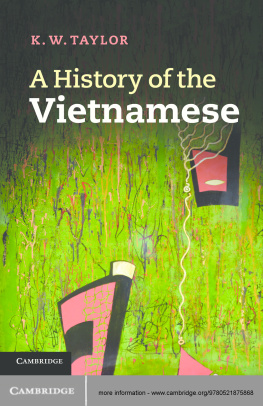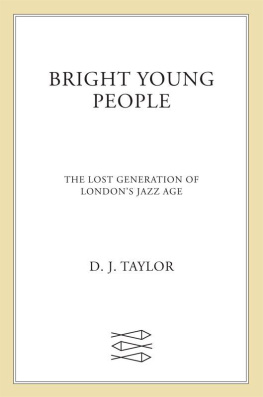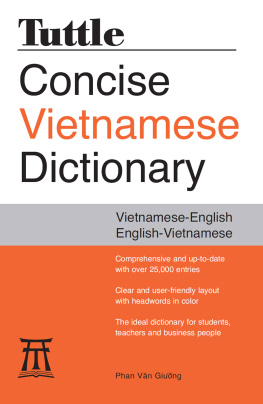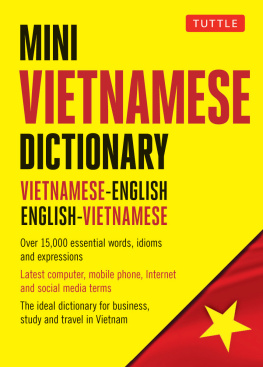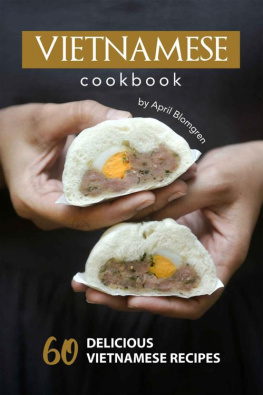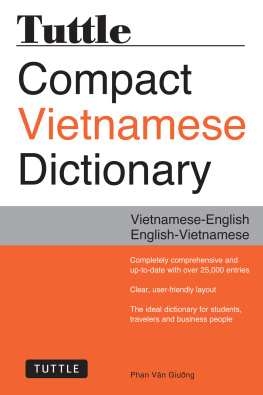Taylor - A History of the Vietnamese
Here you can read online Taylor - A History of the Vietnamese full text of the book (entire story) in english for free. Download pdf and epub, get meaning, cover and reviews about this ebook. City: Cambridge, Vietnam, year: 2014, publisher: Cambridge University Press, genre: Home and family. Description of the work, (preface) as well as reviews are available. Best literature library LitArk.com created for fans of good reading and offers a wide selection of genres:
Romance novel
Science fiction
Adventure
Detective
Science
History
Home and family
Prose
Art
Politics
Computer
Non-fiction
Religion
Business
Children
Humor
Choose a favorite category and find really read worthwhile books. Enjoy immersion in the world of imagination, feel the emotions of the characters or learn something new for yourself, make an fascinating discovery.
- Book:A History of the Vietnamese
- Author:
- Publisher:Cambridge University Press
- Genre:
- Year:2014
- City:Cambridge, Vietnam
- Rating:5 / 5
- Favourites:Add to favourites
- Your mark:
- 100
- 1
- 2
- 3
- 4
- 5
A History of the Vietnamese: summary, description and annotation
We offer to read an annotation, description, summary or preface (depends on what the author of the book "A History of the Vietnamese" wrote himself). If you haven't found the necessary information about the book — write in the comments, we will try to find it.
Taylor: author's other books
Who wrote A History of the Vietnamese? Find out the surname, the name of the author of the book and a list of all author's works by series.
A History of the Vietnamese — read online for free the complete book (whole text) full work
Below is the text of the book, divided by pages. System saving the place of the last page read, allows you to conveniently read the book "A History of the Vietnamese" online for free, without having to search again every time where you left off. Put a bookmark, and you can go to the page where you finished reading at any time.
Font size:
Interval:
Bookmark:

The history of Vietnam prior to the nineteenth century is rarely examined in any detail. In this groundbreaking work, K. W. Taylor takes up this challenge, addressing a wide array of topics from the earliest times to the present day including language, literature, religion, and warfare and themes including Sino-Vietnamese relations, the interactions of the peoples of different regions within the country, and the various forms of government adopted by the Vietnamese throughout their history. A History of the Vietnamese is based on primary source materials, combining a comprehensive narrative with an analysis which endeavors to see the Vietnamese past through the eyes of those who lived it. Taylor questions long-standing stereotypes and clichs about Vietnam, drawing attention to sharp discontinuities in the Vietnamese past. Fluently written and accessible to all readers, this highly original contribution to the study of Southeast Asia is a landmark text for all students and scholars of Vietnam.
K. W. TAYLOR is a professor in the Department of Asian Studies at Cornell University. His career began in the US army, where he was deployed in the USVietnam War. He has now been researching Vietnam for nearly forty years, and his work has made a fundamental contribution to the development of the field.

This publication is in copyright. Subject to statutory exception and to the provisions of relevant collective licensing agreements, no reproduction of any part may take place without the written permission of Cambridge University Press.
Cambridge University Press has no responsibility for the persistence or accuracy of URLs for external or third-party internet websites referred to in this publication, and does not guarantee that any content on such websites is, or will remain, accurate or appropriate.
I wish to acknowledge my gratitude to four people who have provided inspiration for this book. The late Paul G. Fried (19192006), whom I encountered at Hope College nearly half a century ago, gave me confidence in the importance of studying the past and in the possibility of becoming a historian; without his encouragement, I doubt if I would have subdued the disquiets of wartime experience to commence a life of scholarship. John K. Whitmore, who initiated me into the study of Vietnamese history at the University of Michigan, demonstrated a commitment to academic study, an intellectual integrity, and an abiding curiosity about the past that have given me a deep appreciation for the craft of the historian. The late Oliver W. Wolters (19152000) taught me how to critique my ideas about historical study; his questing mind was a constant prompt to reread and to rethink texts with an awareness of the options exercised by those who wrote them. The late Alton L. (Pete) Becker (19322011), both during my training at the University of Michigan and during a summer seminary in 1992, taught me a love of words, of how language shapes and is shaped by thought, and of the pleasure of translation; his influence has gone deep into how I understand culture as a process of telling stories and of translating them. Olga Dror, my wife, has been my intellectual companion and most valued discussant for ideas about the Vietnamese past.
When people first began to live on Earth, terrain was very different from what it is today. For tens of thousands of years, what we know as the country of Vietnam was the mountainous western edge of a broad plain. Now covered by the Gulf of Tonkin and the South China Sea, this plain extended in places for hundreds of kilometers east of the modern coastline and included a massif that we now call Hainan Island. Today we can imagine that beneath the mud at the bottom of the sea lie the relics of the people who inhabited this plain. But our knowledge of their existence comes only from the remains of quarries and workshops where they crafted stone tools at the tops of mountains along the modern Vietnamese coast. During that time, people also inhabited the mountains in what is now northern Vietnam, and we know of them from what they left in the caves where they lived.
About twelve to eight thousand years ago, the coastline shifted westward as sea levels rose with the melting of the ice-age glaciers. The water reached to around 5.8 meters above the modern level of the sea and penetrated into the mountain valleys. Thereafter, the sea gradually receded to its present level, exposing a chain of coastal plains that became the lowlands of what is now Vietnam. The most important of these plains for early Vietnamese history is the most northern of them. This is the plain of the Red River. It was formed by grey oceanic sediment emerging from the receding sea that has been increasingly streaked by accumulations of the red silt that has given the Red River its name.
The Red River flows in nearly a straight line from the Yunnan plateau to the sea. It follows what geologists call the Red River Fault Zone. This is a major geological discontinuity where for millions of years the land south of the fault has been shearing a few millimeters each year southeastward under tectonic pressure from the Indian subcontinent against the Eurasian land mass. The plain of the Red River, along with the smaller plains of the Ma and Ca Rivers immediately to the south, make up the scene in which Vietnamese history was lived until the fifteenth century.
Between four and five thousand years ago, people with stone tools began to live on these plains in agricultural communities with rice, domesticated animals, and pottery. It is fruitless to speculate about the origins of these people. They lived so long ago and left such meager evidence of their existence that they are impervious to our strategies for using archaeological, geological, geographical, or linguistic evidence to identify them as having arrived from a particular somewhere. They may have come from the continental land mass, they may have come from the lands submerged beneath the sea, or, most likely of all, they may have come from a mixture of peoples from both directions.
Font size:
Interval:
Bookmark:
Similar books «A History of the Vietnamese»
Look at similar books to A History of the Vietnamese. We have selected literature similar in name and meaning in the hope of providing readers with more options to find new, interesting, not yet read works.
Discussion, reviews of the book A History of the Vietnamese and just readers' own opinions. Leave your comments, write what you think about the work, its meaning or the main characters. Specify what exactly you liked and what you didn't like, and why you think so.

